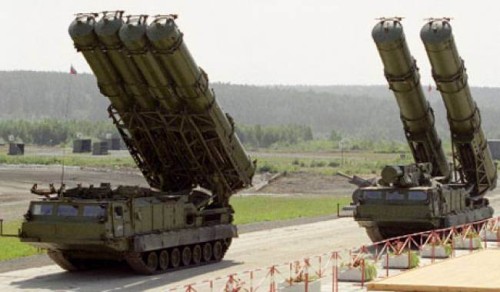LATEST
- Iran and Israel Cooperate Over Monitoring of Ban on Nuclear Bomb Tests
- Iran Suspends Pilgrimages to Saudi Arabia
In a diplomatic and military power play, Russia suddenly announced on Monday that it is supplying advanced S-300 anti-aircraft missile systems to Iran.
Russian President Vladimir Putin announced on Monday that a contract for the S-300s, suspended since 2010 amid Western pressure, would now be fulfilled.
The announcement comes less than two weeks after Iran and the 5+1 Powers announced a framework for a comprehensive nuclear agreement, followed by public disputes over terms such as the timing of the removal of US-led sanctions on Tehran. Shipment would also be a pointed signal amid the ongoing Syrian crisis — where Russia and Iran back the Assad regime — and recent Saudi-led aerial intervention in Yemen, against the Iranian-backed Houthi movement, which controls the capital Sanaa and is advancing through the country.
“The decree cancels the ban from transit through Russia (including by air), transportation outside the territory of Russia to the Islamic Republic of Iran and also handover to the Islamic Republic of Iran outside the territory of Russia — with the use of ships and aircraft flying the Russian state flag — of the S-300 air defense missile systems,” a Kremlin statement said.
Foreign Minister Sergei Lavrov later told journalists, “We believe that at this stage, the need for this kind of embargo, particularly a voluntary Russian embargo, has completely disappeared.” He said the missiles could be shipped “promptly” when Russian officials decide to send them.
Lavrov tied the news to the developments in the Middle East, contending that it was “very important” that Iran procure an air-defense system “especially now that tensions have run high in the surrounding environment”.
Russia had repeatedly said in recent years that it would not complete the 2010 contract, prompting a $4-billion international arbitration suit from Iran.
Iran’s Secretary of the National Security Council, Ali Shamkhani, who has been in talks in Moscow, said he expected delivery this year of the S-300s, which have a range of 125 miles. He echoed Lavrov’s reference to the regional context, saying the Russian decision is “a kind of a signal for ensuring security in the region, given Iran’s important role in this”.
The US responded sharply to the announcement. Secretary of State Kerry phoned Lavrov with objections, while White House press secretary Josh Earnest spoke of “serious concerns”: “Russia understands that the United States certainly takes very seriously the safety and security of our allies in the region.”
Israeli ministers used the news to denounce the nuclear framework, reached on April 2, warning that support for Iran to “arm itself with advanced weapons will only increase its aggression”.
In another indication that it is using the framework to boost support of Iran — as well as working around the continuing effects of US-led sanctions — Moscow said it will now implement an oil-for-goods agreement to shore up Tehran’s troubled economy.
Since late 2013, Iran has trumpeted the possible arrangement — said to be worth up to $1.5 billion per month, covering 500,000 barrels of Iranian oil per day — in which it would obtain large supplies of Russian food, industrial goods, and construction materials. However, the deal had been repeatedly held up, including the collapse of an August 2014 declaration of its completion.
On Monday, Deputy Foreign Minister Sergei Ryabkov told the upper house of Parliament that the exchange could now proceed as a step towards a resumption of unrestricted trade.
Iran and Israel Cooperate Over Monitoring of Ban on Nuclear Bomb Tests
Iran and Israel have been cooperating in an international body monitoring a ban on nuclear bomb tests.
The countries have been involved in technical meetings, including in Jordan in November and December to practice the detection of illicit testing. The meetings have been held pending the ratification of the Comprehensive Nuclear Test Ban Treaty, negotiated in the 1990s, which needs the signature of eight more nuclear technology states — including Israel, Iran, Egypt, and the US — to come into force.
“Iran took part in the drill. Egypt was part of this drill. I think all the Arab countries were represented in Jordan for this exercise,” Lassina Zerbo, executive secretary of the Preparatory Commission for the Comprehensive Nuclear Test Ban Treaty Organization, said during a visit to Israel:
During the exercise, when we had our round-table discussions or dinner or lunches, you had Iranian experts and Israeli experts sitting at the same table. It’s not unusual that we see that in the technological field we have people who don’t necessarily get together politically but who find things to agree on in the scientific framework.
Among the CTBTO’s hundreds of monitoring facilities are two seismic stations in Israel and one in Iran which has been inactive since 2006 amid difficulties over sanctions on equipment.
Zerbo voiced hope of getting the Iranian site back on-line.
Iran Suspends Pilgrimages to Saudi Arabia
Amid rising tensions with Saudi Arabia, Iran has ordered a halt to pilgrimages to the holy city of Mecca.
President Rouhani’s ban stems from accusations that two teenage Iranian boys were sexually harassed by Saudi officers in Jeddah airport last month. The incident and the Saudi intervention in Yemen have sparked demonstrations, including another on Monday, in front of the Saudi Embassy in Tehran.
The ban applies to umrah, a pilgrimage that can be taken to Mecca at any time of the year. It remains to be seen if it will be applied to the hajj, the annual pilgrimage, which takes place in September this year.
Culture Minister Ali Jannati said the suspension would remain until Saudi officers were punished for the alleged sexual assault on the Iranian teenagers.
Before Monday’s announcement, Iranian pilgrims had complained that the Saudi Embassy stopped issuing visas, and at least two aircraft transporting pilgrims from Iran to Jeddah were denied permission to land. Tehran then suspended the pilgrimage flights.
About 500,000 Iranians visit Mecca each year.

